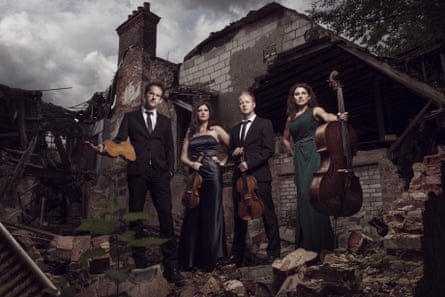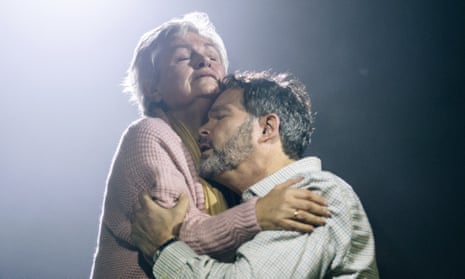Despite relentless Soviet efforts to tame the music of Dmitri Shostakovich, his creative spirit “always sprang back, as if made of tempered steel”, wrote his lifelong friend, the literary critic Isaak Glikman. The composer perhaps burnished that steel best in his 15 string quartets, intimate personal testimonies that chart his life and fortunes in the vice-like grip of totalitarianism.
Deliberately abstruse about his intentions, Shostakovich is easy to misinterpret, even today. So the Carducci Quartet’s latest music and words project, Shostakovich: Life, Letters & Friendship, is a welcome, richly rewarding contribution to our understanding of one of the great figures of the 20th century.
We learn, for instance, that Quartet No 8, perhaps Shostakovich’s most widely known, though dedicated to “the victims of fascism and war”, is also the composer’s howl of shame and fury at being forced in 1960 to join the Communist party, the party that had publicly denounced and once banned his music. Its savage allegro molto takes on extra meaning after the actor Samuel West reads from Glikman’s recollections of that shameful incident.

Letters to Glikman and the critic’s book on Shostakovich, Story of a Friendship, are just some of the sources used by the Carducci’s cellist, Emma Denton, to devise this brilliantly constructed programme. We hear absurd yet menacing official pronouncements on what was considered to be “healthy” Soviet music, alongside a moving description of the premiere of the Fourth Quartet, where a violinist describes Shostakovich’s haggard face, the product he believed, of living “permanently in the expectation of violent death”.
Yet this journey through selected movements from relevant quartets isn’t always gloomy. Much vodka is taken, laughter ensues; musicians talk of feeling like “fearless unmaskers of hypocrisy”. There is even a funny story about the great cellist Mstislav Rostropovich hitching a ride on a motorbike and arriving “looking like a chimney sweep”. Throughout, the Carducci Quartet play with total commitment, forcing you to think afresh about the music and its context. I’m told several festivals around the UK are considering whether to stage this profound event next year. They shouldn’t hesitate.
Bluebeard’s Castle is another chillingly cold, darkly menacing place. Bloodstained horrors lurk here, but as the spoken prologue to Béla Bartók’s one-act opera asks, is the grim tale unfolding before our eyes or behind them? His Bluebeard hides his secrets behind locked doors; we hide ours away in our heads. Is there really any difference?
A rare opportunity to explore these questions came about last weekend when it was possible to hear two interpretations of Bartók’s masterpiece in one day, each outstanding, each dramatically different – first at the intimate Stone Nest, right in the heart of London’s theatreland (a Welsh chapel that once housed the colourful Limelight club), and later in the wide open spaces of the Royal Festival Hall, with the London Philharmonic Orchestra.
Staged with alternating casts, the new company Theatre of Sound took the Bluebeard story of a doomed marriage and used it to explore a pressing contemporary theme: dementia. In director Daisy Evans’s new translation, bass-baritone Gerald Finley’s Bluebeard was no distant, brooding tyrant but a caring, if bewildered husband, welcoming his wife, Judith (Susan Bullock), back to a suburban home she does not recognise, while also attempting to shield her from his secrets. Those fearsome doors were replaced by a single suitcase, repository of a lifetime of memories, each one more difficult for Judith to grasp.
As each memento was revealed, actors spilled on to the stage, portraying Judith in her past life as lover, wife and mother and possibly also as Bluebeard’s three former wives, an ambiguity cleverly handled, helping us share in Judith’s bafflement. In such a tiny venue, with the audience just feet away, every glance, every nuance, was on display. Finley and Bullock were superb, both in glorious voice, both utterly convincing as their marriage dissolved into the darkness of dementia. Conductor Stephen Higgins had reduced Bartók’s massive orchestral score to just eight parts, played by members of the London Sinfonietta. Inevitably, some of the brilliant colours of the original were lost in the process, but Bartók’s spirit and intent were still firmly in place.

Across town, those colours dazzled in the inspirational hands of the LPO’s dynamic new chief conductor, Edward Gardner. Marshalling 111 players, his Bluebeard’s Castle became a towering edifice of sound, particularly as Judith opened the door on Bluebeard’s vast kingdom, where Bartók calls for extra trumpets and trombones to swell the sound, reinforced by a triumphant organ. Gazing out over these sonic hills and mountains were creamy mezzo Ildikó Komlósi, as dignified yet implacable Judith, and imposing bass John Relyea, rock-solid as an imperious Bluebeard. Unforgettable.
Star ratings (out of five)
Shostakovich: Life, Letters & Friendship ★★★★★
Bluebeard’s Castle Stone Nest ★★★★★
Bluebeard’s Castle Royal Festival Hall ★★★★★
Bluebeard’s Castle is at Stone Nest, London, until 14 November

Comments (…)
Sign in or create your Guardian account to join the discussion